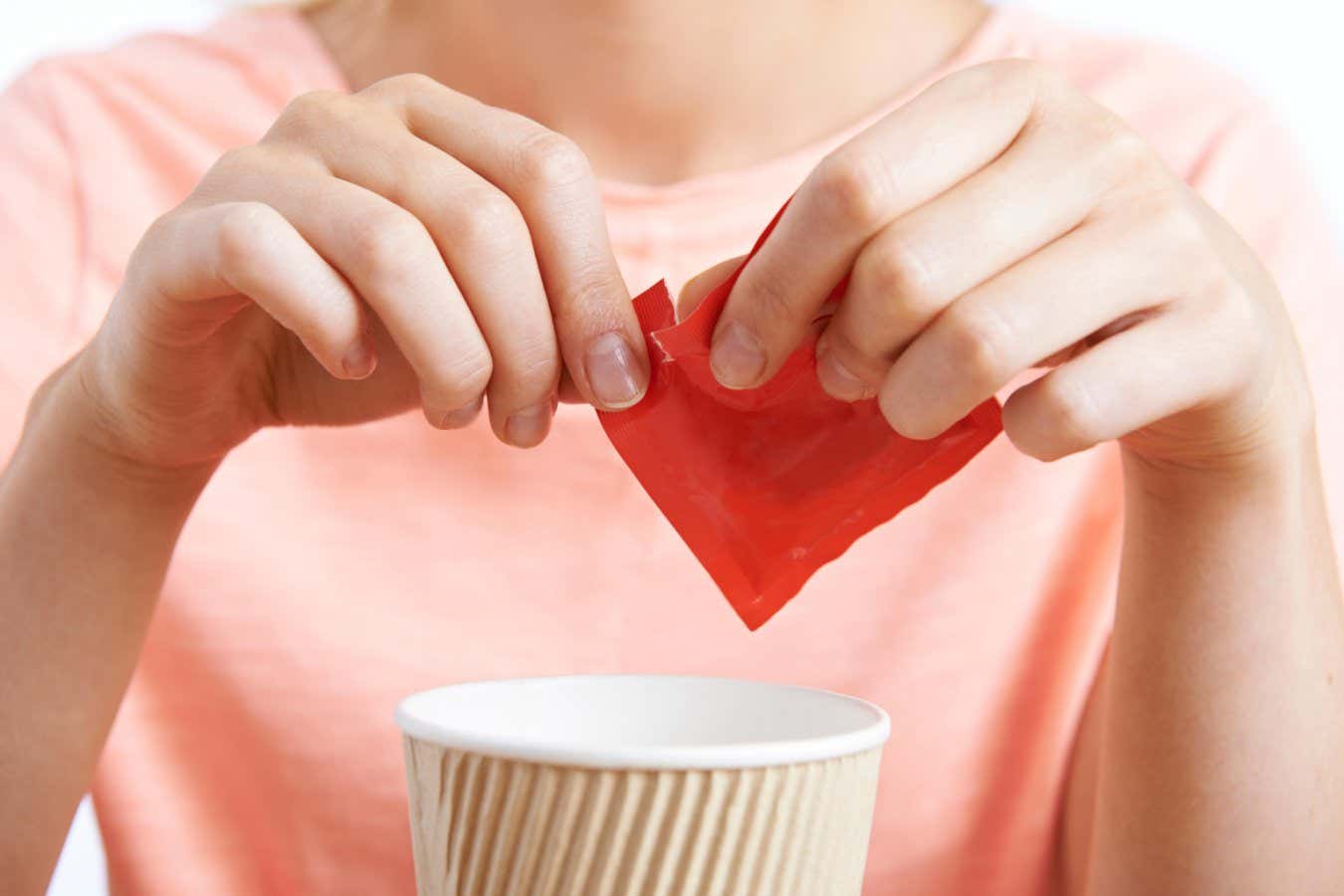
Some artificial sweeteners can change the composition of the gut microbiome, which impacts health more broadly
Ian Allenden/Alamy
People who consume the artificial sweetener sucralose are less likely to respond to cancer immunotherapy, suggesting the sweetener may blunt the treatment’s effects.
Immunotherapy helps the immune system detect and destroy cancer cells, making it a crucial treatment for numerous cancers. “When it works, it works very well. Patients can be disease free and go about their lives and live for years and years,” says Abigail Overacre-Delgoffe at the University of Pittsburgh in Pennsylvania. “Unfortunately, immunotherapy doesn’t work for all patients, and in many cancer types, it only works for the minority of patients.”
It isn’t clear why that is, though numerous studies indicate the gut microbiome plays a role, as it helps regulate immune responses. Previous research has also shown that artificial sweeteners can change the composition of gut microbes in humans.
So Overacre-Delgoffe and her colleagues assessed the potential impact of artificial sweeteners on immunotherapy. They tracked treatment outcomes in 157 people who underwent cancer immunotherapy for at least three months. Of the participants, 91 had advanced melanoma, 41 had advanced non-small cell lung cancer and 25 had melanoma that was surgically removed but had a high likelihood of returning.
Before starting treatment, participants completed a questionnaire that assessed their diet over the previous month, which the researchers then used to estimate artificial sweetener consumption.
Consuming more than 0.16 milligrams of sucralose per kilogram of bodyweight a day was associated with worse treatment outcomes. Participants with advanced melanoma who consumed less sucralose lived a median of 5 months longer without their cancer progressing, compared with those who consumed more.
For participants with non-small cell lung cancer, the difference was 11 months. In participants at high risk of melanoma returning, those who consumed less sucralose remained cancer-free for a median of 6 months longer than those who consumed more.
Similar differences were seen among participants who consumed more than 0.1 milligrams of another artificial sweetener, acesulfame K, per kilogram of bodyweight a day.
The US Food and Drug Administration (FDA) recommends people consume no more than 5 milligrams of sucralose per kilogram of bodyweight a day. “So what we’re finding is that the level that appears to subvert the effect of immunotherapy is not half the recommended level. It isn’t 25 per cent of the recommended level. It is about 5 per cent of the recommended daily level,” says Diwakar Davar at the University of Pittsburgh. “The implication is you don’t need a lot to have a relatively bad effect.”
Further experiments in mice with tumours from common types of cancer – adenocarcinoma or melanoma – showed that adding sucralose to their water during immunotherapy increased tumour growth and reduced survival.
Genetic analysis revealed that T-cells – immune cells leveraged by immunotherapy to kill cancer – were impaired in the mice receiving sucralose. Faecal samples also showed significant changes in the rodents’ gut microbiomes, with increased activity in pathways that break down arginine, an amino acid that T-cells rely on to function.
These results suggest that sucralose interferes with immunotherapy by altering the gut microbiome in a way that depletes arginine, thus impairing T-cell function. Further experiments showed that arginine supplements improved survival in mice receiving sucralose until their survival odds were roughly the same as those that weren’t consuming the sweetener.
However, it is unclear whether sucralose has the same effect on the gut microbiome and T-cell function in humans, says Jotham Suez at Johns Hopkins University in Maryland. “It is very difficult in human data, especially human nutrition data and in the way they have collected it using food frequency questionnaires, to isolate the specific impact of non-nutritive sweeteners in general – and even furthermore, to isolate just the impact of sucralose on any given clinical outcome,” he says.
“We spend so much time trying to develop new drugs, which is an expensive, difficult and lengthy task,” says Davar. Finding ways to make existing treatments more effective – such as cutting out artificial sweeteners or taking arginine supplements – would be a simpler and cheaper alternative.
But whether that improves outcomes in people requires more research. “So in a challenging funding climate, trying to ensure that these research priorities continue to be supported is very important,” says Davar.
Topics:
Source link : https://www.newscientist.com/article/2490684-common-artificial-sweetener-may-interfere-with-cancer-treatments/?utm_campaign=RSS%7CNSNS&utm_source=NSNS&utm_medium=RSS&utm_content=home
Author :
Publish date : 2025-07-31 15:00:00
Copyright for syndicated content belongs to the linked Source.





